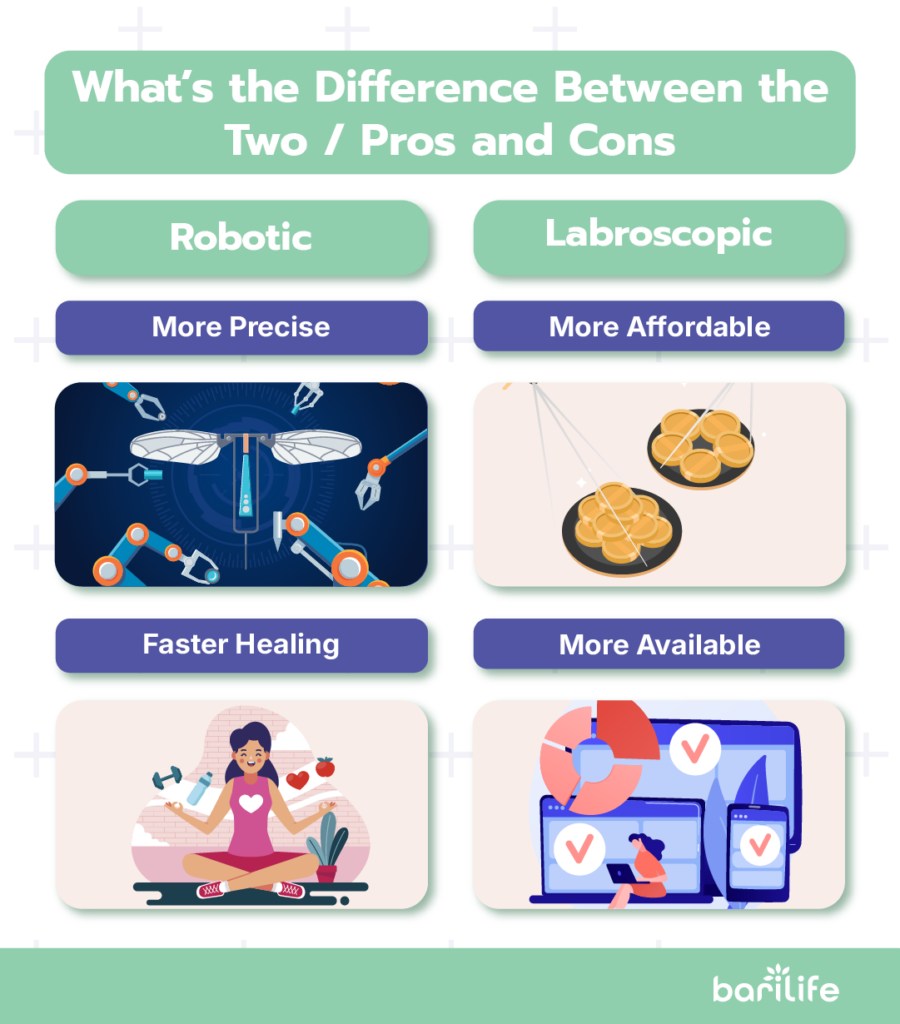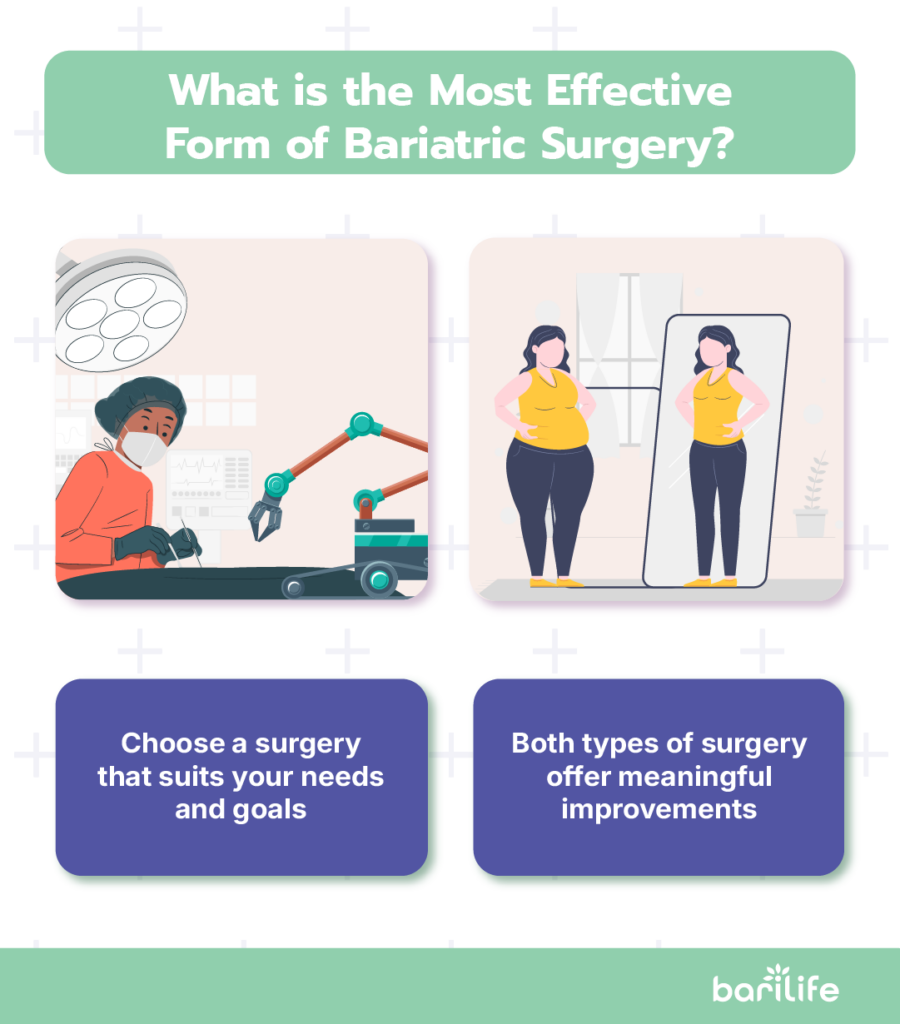When considering what is bariatric surgery?, both robotic and laparoscopic techniques offer effective, minimally invasive options. Each approach has its benefits, but the decision often comes down to individual health needs as well as the skills and preferences of the surgeon. In this article, we’ll explore the key differences between robotic and laparoscopic bariatric surgery to help determine which might be the better choice for you.
Table of Contents
Overview of Bariatric Surgery
Bariatric surgery is a type of weight-loss surgery designed to help people manage obesity and related health issues like diabetes, high blood pressure, and sleep apnea. There are several types of bariatric surgery, with the most common being gastric bypass, sleeve gastrectomy, and adjustable gastric banding. These procedures work by altering the digestive system to limit food intake.
People undergoing these surgeries often require bariatric vitamins to support their nutrition. Specific supplements like bariatric multivitamins and bariatric calcium chews can prevent nutrient deficiencies post-surgery. Additionally, some patients might need a bariatric multivitamin with iron or a liquid bariatric vitamin for better absorption.
Bariatric surgery is usually recommended for individuals with a body mass index (BMI) of 40 or higher, or 35 or higher if they have other serious health problems linked to obesity. The benefits of this surgery often include improved quality of life and better management of chronic conditions.
However, there are risks to consider, such as complications from surgery, potential nutrient deficiencies, and psychological changes. Bariatric surgery safe procedures rely heavily on thorough pre-operative evaluations and post-operative care.
That’s why it’s important to undergo a thorough evaluation before surgery and commit to regular follow-ups afterward to ensure long-term success and safety.

What is Laparoscopic Bariatric Surgery?
Laparoscopic bariatric surgery is a minimally invasive approach to weight-loss surgery, where small incisions are made instead of one large cut. This method helps lower the chances of complications, like infections or hernias, and is commonly used for procedures such as gastric bypass and sleeve gastrectomy.
Not only is it super safe and effective, but it’s also known as the gold standard in weight-loss surgeries. With a great track record for success, it’s become a go-to option for those looking to lose weight and improve their health.
What is Robotic Bariatric Surgery?
Robotic bariatric surgery is a modern, high-tech approach to weight-loss surgery that uses robotic systems, like the Da Vinci Surgical System, to give surgeons incredible precision and control. Imagine a surgeon with super steady hands, able to make tiny, precise movements during the procedure—that’s the magic of robotics! Just like laparoscopic surgery, it’s minimally invasive, meaning small incisions and a camera are used to guide the process. The difference is that robotic tools offer even more flexibility and stability, which can lead to smoother procedures.
Because it’s so precise, robotic surgery often means less pain, shorter hospital stays, and a quicker recovery. So, you can be back on your feet and on your way to better health faster than with traditional open surgeries.
What’s the Difference Between the Two / Pros and Cons
The main difference between robotic and laparoscopic bariatric surgery comes down to precision and accessibility. Robotic surgery, thanks to this advanced technology gives surgeons more precision and flexibility, which can be especially helpful for complex cases or patients in a ramped position bariatric setting. However, laparoscopic surgery is more commonly available and generally more affordable, making it a popular choice.
When it comes to recovery, robotic surgery often leads to faster healing, less pain afterward, and reduced risk of infection, though it can take a bit longer to perform. Laparoscopic surgery has similar outcomes but might carry a slightly higher risk of manual error since it’s not as high-tech as robotic systems.
In terms of bariatric surgery cost, robotic surgery tends to be more expensive because of the cutting-edge technology and specialized training required. Laparoscopic surgery, while highly effective, may not offer the same level of precision for more complicated cases, but it’s still a trusted and widely used option.

| Robotic | Laparoscopic | |
| Precision | Thanks to the advanced technology, surgeons are able to get very precise. | Higher risk of manual error: Because this surgery is done without the assistance of robotic technology, there is room for human error. |
| Flexibility | The robotic technology allows the surgeon to be more flexible during the procedure. These operations take longer to perform. | Less flexibility due to laparoscopic surgery being performed by hand and providing 2D images rather than 3D images. |
| Healing | Robotic surgery leads to faster healing as only small incisions are made and the surgeon is able to be more precise. | Comparable recovery time, incisions are still small yet less precision could lead to longer recovery time. |
| Pain | Because this surgery is easier to recover from, patients experience less pain. | This may result in more pain and complications following surgery due to less precision. |
| Infection risk | As the incision sites are smaller, there is a reduced risk of infection. | Higher infection rate due to larger incision sites. |
| Affordability | Less common and more expensive. | Because this type of surgery has been around for quite some time, it is more affordable |
| Availability | Limited availability – only available at hospitals with robotic technology – but is becoming more common. | Commonly available: This availability helps the surgery become more affordable. |
What is the Most Effective Form of Bariatric Surgery?
When it comes to bariatric surgery, both gastric bypass and sleeve gastrectomy are highly effective for long-term weight management, but each has its strengths. Gastric bypass often leads to more significant weight loss and better outcomes for conditions like diabetes. However, sleeve gastrectomy is also effective and is a simpler procedure. Both surgeries offer meaningful results, and the right choice depends on individual health needs.
As mentioned above, robotic bariatric surgery is gaining popularity for its precision and quicker recovery times. However, laparoscopic surgery is more widely used due to its affordability and similar outcomes, making it a reliable option for most patients.
Ultimately, there is no significant difference in key outcomes between robotic and laparoscopic bariatric surgery. The most effective type of surgery is one that aligns with your specific health condition and preferences, with input from an experienced surgeon to ensure the best results.

Conclusion
When it comes to choosing the right bariatric surgery, both robotic and laparoscopic options provide minimally invasive solutions for effective weight management. The best choice depends on your health needs, the complexity of the surgery, and whether you require a reversible bariatric surgery or a bariatric revision surgery later on.
As robotic technology continues to evolve, it may set new benchmarks for precision and safety in the future.
It’s crucial for you to have a thorough discussion with your healthcare provider to explore the risks, benefits, and suitability of each procedure.




What are your tips and tricks to post-bariatric success?